动词变名词小结
动名词小结

动名词小结动名词(gerund)是一种特殊的名词形式,它由动词的现在分词形式(-ing 结尾)构成,表示动作或状态。
动名词可以在句子中扮演主语、宾语、表语、定语和状语的角色。
下面是动名词的用法和注意事项的小结。
一、动名词作主语:1. 动名词作主语通常表达一种习惯性、永久性的动作或真理。
例如:Swimming is good for your health.(游泳对身体好。
)2. 注意不仅可用于单数动词作主语,也可用于复数动词作主语。
二、动名词作宾语:1. 动名词可以作及物动词的宾语,并且与及物动词连用,形成动名词短语。
例如:I enjoy swimming in the sea.(我喜欢在海里游泳。
)2. 一些常见的及物动词后面通常接动名词作宾语,例如:like, love, hate, enjoy, avoid, admit, finish, consider, appreciate, suggest 等。
例如:I hate doing housework.(我讨厌做家务。
)三、动名词作表语:1. 动名词可以作连系动词的表语,常用动词有be, feel, look, sound, appear, seem等。
例如:The baby sounds happy.(这个宝宝听起来很开心。
)四、动名词作定语:1. 动名词可以作名词的前置修饰语,用来修饰名词或名词短语。
例如:I saw a man(who was) running towards me.(我看见一个朝我跑来的人。
)五、动名词作状语:1. 动名词常用于表示目的、原因、结果、时间、方式、条件、让步和方式等状语的作用。
例如:He went to the park for playing football.(他去公园踢足球。
)2. 动名词在短语中作状语时,通常放在谓语动词之后。
例如:She is good at playing the piano.(她擅长弹钢琴。
英语动名词归纳总结W

英语动名词一、名词复数的变化规律1、规则变化1) 一般情况直接在词尾加-s . 如:chair—chairs;apple—apples;grape—grapes;desk—desks等。
2)以s、sh、ch、x等结尾的词加–es .如:bus—buses;watch—watches;box—boxes;brush—brushes等。
3)以辅音字母+y结尾的词,变y 为i 再加es,baby—babies;city—cities;family—families等。
4)以f或fe结尾的将f或fe直接换成ves. 如:knife—knives;thief—thieves;shelf—shelves等。
2、不规则变化1)没有规律的变化。
如:child—children;foot—feet;tooth—teeth;mouse—mice;woman—women等。
2)单复同形。
如:deer—deer;sheep—sheep;fish—fish;yuan—yuan;tofu—tofu;pork—pork等。
3)以o结尾的名词有的加es有的加s. 如:potato—potatoes;tomato—tomatoes;Hero—heroes等。
二、动词第三人称单数的变化规则1)直接在动词后+s. 如:like—likes;play—plays;read—reads;get—gets;help—helps;ski—skis等。
2)以s, x, sh, ch, 接尾的动词:+es. 如:wash—washes;wacth—watches;teach—teaches;brush—brushes等。
3)以辅音+o接尾的动词:+es. 如:go—goes;do—does等。
4)以辅音+y接尾的动词:变y为i+es. 如:fly—flies;study —studies;carry—carries;sky—skies等。
末尾字母y前为元音字母的,直接在动词后面加-s. 如:play—plays;say—says等。
动词-ing形式小结

动词-ing形式小结动词-ing形式概述v.-ing 形式包括传统语法的现在分词和动名词两部分,像动词不定式一样,它既具有动词时态和语态的特征,又具有名词、形容词和副词的特征,它可以在句中作主语、表语、定语、宾语、状语、宾语补足语、主语补足语等。
动词-ing形式的时态、语态主动语态被动语态一般式 writing being written完成式 having written having been written否定式 not writingv.-ing形式的一般式V.-ing形式的一般式的构成,表示动作发生在谓语动词动作的同时、之前或之后。
用来泛指动作,没有时间的区分。
Seeking after knowledge is human nature.求知是人的本性。
Travelling abroad can widen one’s outlook.出国旅游会扩大人们的视野。
Eating too much chocolate is bad for your teeth.吃太多的巧克力对你的牙齿有害。
My favourite sport is playing table tennis.我最喜欢的运动是打乒乓球。
行为与主要动作同时发生,表示伴随。
The students came into the classroom laughing and talking.学生们又说又笑地走进了教室。
As she saw me,she came over smiling.她看到我时,笑容可掬地走过来。
Doing the washing up,Connie was planning her holiday.康妮在洗碗的时刻盘算着怎样度假。
行为在主要动作之前或之后。
Antonio remembered sending his mother an email three times last month.安东尼记得上个月给他母亲发了三次电子邮件.(在前)Mr. Lee went out shutting the door behind him.李先生出去后将门随手关上。
初中英语动词ing-用法小结

初中英语动词ing用法小结[导读]动词finish,mind,enjoy,practise,keep等后接动词,要用动名词形式作宾语。
在英语教学中,我发现考动词-ing形式的题目很多。
根据多年教学经验,现在把初中阶段-i n g 的情况总:一、一些动词后要接动名词作宾语1.Everyoneenjoys____(watch)TVintheevening.2.Pleasefinish____(draw)thepictureafterschool.3.Thestudentspractise____(read)Englisheverymorning.【解析】动词finish,mind,enjoy,practise,keep,miss,hate,consider,continue,Imagine,suggest,advise等后接动词,要用动名词形式作宾语。
答案是:watching;drawing;reading.二、一些介词后面要加动名词作宾语1.Heisgoodat____(write).2.Wearelookingforwardto____(see)you.3.Theyareinterestedin____(listen)tomusic.4.Youcandrinkalotofwaterwithout____(get)fat.【解析】介词后跟动词,要用动名词形式作其宾语。
如下列结构中的介词:thanksfor doingsth,thinkaboutdoing,begoodatdoingsth,dowellindoingsth,succeedindoing,How/Whataboutdoingsth?,insteadofdoingsth,keepsbfromdoingsth,stopsb fromdoingsth,lookforwardtodoingsth,beusedto(习惯于)doingsth,devotetodoingsth,payattentiontodoing,preferdoingtodoing,makeacontribution(贡献)todoingsth答案是:writing;seeing;listening;getting.三、一些固定结构要加动词的ing形式1.Hespendshalfanhour____(do)hishomeworkeveryday.2.Theyarebusy____(prepare)forthecomingtest.3.Wehaveagreattime____(talk)toeachtimeatlunchtime.【解析】在一些固定结构中要求使用动词-ing形式。
英语AB级考试常见词性变化小结

Explore
exploration
Prepare
preparation
determine
determination
Imagine
imagination
organize
organization
Reserve
reservation
harm
harmful
4.名词后加-y,如:
名词
形容词
cloud
cloudy
wind
windy
rain
rainy
sun
sunny
snow
snowy
fun
funny
noise
noisy
health
healthy
luck
lucky
Taste(名词/动词)
tasty
guilt
guilty
short
shortage
5.在名词后加-ly,如:
名词
形容词
friend
friendly
Love
lovely
Day
daily
Year
yearly
Month
monthly
6.+ ous
名词
形容词
Danger
dangerous
generosity
generous
courage
courageous
Variety/
vary(动词)
inform
information
3.以d或de结尾,常变为sion
人教版初二上册英语Unit 5语法知识点总结(精选)
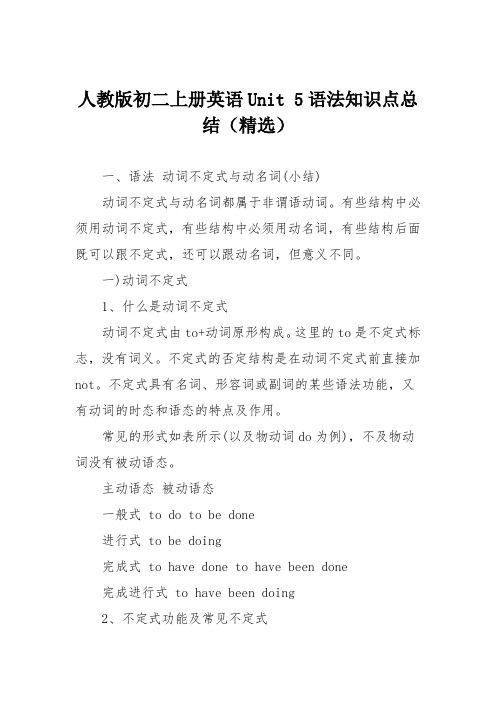
人教版初二上册英语Unit 5语法知识点总
结(精选)
一、语法动词不定式与动名词(小结)
动词不定式与动名词都属于非谓语动词。
有些结构中必须用动词不定式,有些结构中必须用动名词,有些结构后面既可以跟不定式,还可以跟动名词,但意义不同。
一)动词不定式
1、什么是动词不定式
动词不定式由to+动词原形构成。
这里的to是不定式标志,没有词义。
不定式的否定结构是在动词不定式前直接加not。
不定式具有名词、形容词或副词的某些语法功能,又有动词的时态和语态的特点及作用。
常见的形式如表所示(以及物动词do为例),不及物动词没有被动语态。
主动语态被动语态
一般式 to do to be done
进行式 to be doing
完成式 to have done to have been done
完成进行式 to have been doing
2、不定式功能及常见不定式
第一类:动词+不定式
语法分析:有些及物动词后面可以用不定式表示动作的对象,这时不定式相当于名词或代词,做及物动词的宾语。
1) want to do sth. 想做某事
①Do you want to watch a game show?
通过对人教版初二上册英语Unit 5语法知识点总结(精选)的学习,是否已经掌握了本文知识点,更多参考资料尽在!。
英语中动词的作用

英语中动词的作用动词在英语中扮演的重要角色什么是动词?动词是英语中最关键的一部分,它是句子的核心,用于描述或表示动作、状态或发生的事件。
英语中的动词有许多不同的功能和用法,下面是一些常见的用途:•表示动作或行为:例如,“run”(跑),“write”(写),“dance”(跳舞)•描述状态或感受:例如,“be”(是/在),“feel”(感觉),“enjoy”(喜欢)•表示存在或位置:例如,“exist”(存在),“stand”(站立),“lie”(躺)•表示时间或日期:例如,“happen”(发生),“occur”(出现),“take place”(举行)动词的时态动词的时态表示动作发生的时间。
英语中最常见的时态有以下几种:•现在时:表示目前正在进行或经常发生的动作。
例如,“I am studying English”(我正在学习英语)。
•过去时:表示过去发生或已经完成的动作。
例如,“She played tennis yesterday”(她昨天打了网球)。
•将来时:表示将来要发生的动作。
例如,“They will arrive tomorrow”(他们明天会到达)。
动词的语态动词的语态表示动作执行者与动作承受者之间的关系。
英语中常见的语态有以下几种:•主动语态:表示主语执行动作。
例如,“He wrote a letter”(他写了一封信)。
•被动语态:表示主语接受动作。
例如,“The letter was written by him”(这封信是他写的)。
动词的变化形式英语中的动词有不同的变化形式,包括:•基本形式(原形):表示动词的原始形式。
例如,“go”(去),“eat”(吃)。
•第三人称单数形式:用于表示第三人称单数主语的动作。
例如,“She reads books”(她读书)。
•过去式:用于表示过去发生或已经完成的动作。
例如,“Yesterday, I went to the park”(昨天,我去了公园)。
初中英语动词变名词、动词变形容词方法归纳

词性转换归纳一、动词变名词小结1.在词尾加er,r ,双写加er 或or:A. play _ player, sing _ singer, wait _ waiter , find _ finder,B. write _ writer, drive _ driver, come _ comer, explore _ explorerC. run _ runner, win _ winner, rob _ robber, traval _ travallerD. visit _ visitor, invent _ inventor2. 在词尾加ing:build _ building, draw _ drawing, end _ ending, begin _ beginning,3.在词尾加ion 或去e加ion:A. decide _ decision, describe _ description, produce _ production,celebrate _ celebration,pronounce _ pronunciation, decorate _ decorationB. discuss _ discussion, invent _ invention, attract _ attractionimpress _ impression,inject _ injection,instruct _ instruction4.其它:know _ knowledge, please _ pleasure, enjoy _ enjoyment,practise _ practice,die _ death, succeed _ success, weigh _ weight,sit _ seat, change _ chance,enter _ entrance,fly _ flight,rob _ robbery, discover _ discovery,faile _ failure,appear _ appearance, breathe _ breath二、动词变形容词小结1.词尾加ful:use - useful, care - careful, help - helpful,thank - thankfulpeace - peaceful, forget - forgetful, play - playful,succeed - successful, wonder - wonderful2.词尾加d或ed:please - pleased, unite - united, excite - excited,surprise - surprised, organize - organized, close - closed,wound - wounded, relax - relaxed,develop - developed,3.词尾加ing:interest - interesting, surprise - surprising, excite - exciting develop - developing, frighten - frightening,thrill - thyrilling frustrate - frustrating, relax _ relaxing, live - livingrock - rocking, sleep - sleeping4.词尾变y为i,加ed:worry - worried, marry - married,fry - fried, terrify - terrifiedsatisfy - satisfied5.词尾加able:know - knowledgeable, enjoy - enjoyabe,suit - suitableadjust - adjustable, comfort - comfortable6.其它:lose - lost, fool - foolish, live - lively / alive /living,sleep - sleepy / sleeping / asleep,wake - awake, taste - tasty speak - spoken, break - broken, die - dead, educate - aducational, world - worldwide三、名词变为形容词的方法1. 在名词后面加-y (尤其是一些与天气有关的名词)。
动名词用法小结 -【完整版】
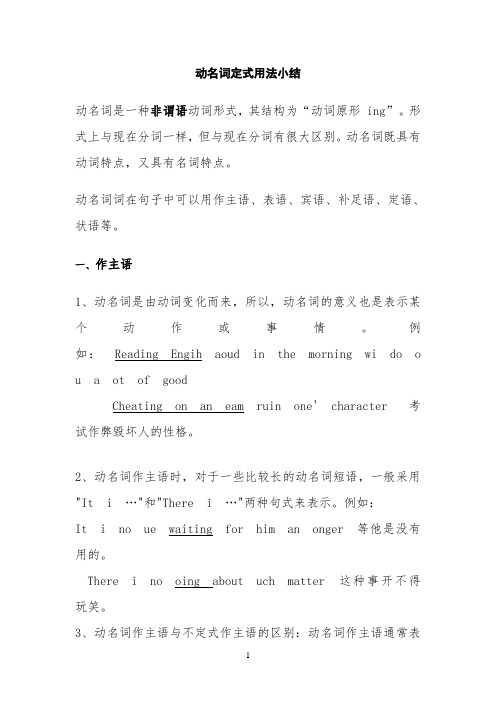
动名词定式用法小结动名词是一种非谓语动词形式,其结构为“动词原形 ing”。
形式上与现在分词一样,但与现在分词有很大区别。
动名词既具有动词特点,又具有名词特点。
动名词词在句子中可以用作主语、表语、宾语、补足语、定语、状语等。
一、作主语1、动名词是由动词变化而来,所以,动名词的意义也是表示某个动作或事情。
例如:Reading Engih aoud in the morning wi do o u a ot of goodCheating on an eam ruin one' character 考试作弊毁坏人的性格。
2、动名词作主语时,对于一些比较长的动名词短语,一般采用"It i …"和"There i …"两种句式来表示。
例如:It i no ue waiting for him an onger 等他是没有用的。
There i no oing about uch matter 这种事开不得玩笑。
3、动名词作主语与不定式作主语的区别:动名词作主语通常表示抽象的或泛指的动作,一般不与特定的动作执行者联系在一起;不定式作主语通常表示具体的动作或行为,往往与特定的动作执行者联系在一起,如:It’ no ue cring over ing net timeThan ou for offering me o much hee3 下列动词后的动名词虽然是被动意义,但不用被动语态:Your car need fiing 你这车要充气了。
Thi cit deerve viiting 这座城市值得光顾一下。
The require tuding carefu 这个问题需要认真研究。
The tree want watering 这些树需要浇水了。
四、作定语动名词作定语的情况并不是很普遍,一般只限于单个的动名词作定语,表示“用于……的”或表示“处于某件事情中的……”含义。
practise的用法小结

practise的用法小结你们知道practise的用法吗?我们一起来学习学习吧,下面就和大家分享,来欣赏一下吧。
practise的用法practise 英[?pr?kt?s] 美[?pr?kt?s]practise是“practice”的变体,只能做动词,其名词为practice,在美语中这个词无论用作动词还是名词都拼成practice,意思是“练习; 实习; 执业”。
第三人称单数:practises 现在分词:practising 过去式:practised 过去分词:practised1、为了做好某件事而“练习”,意思就是练习。
Lauren practises the piano every day. 劳伦每天练习钢琴。
When she wanted to get something right, she would practise and practise and practise.她想做好一件事的时候,就会练习、练习、再练习。
2、指风俗、手艺或宗教等,“练习、参于”其活动。
He was brought up in a family which practised traditional Judaism.他是在一个信奉传统犹太教的家庭长大的。
Acupuncture was practised in China as long ago as the third millennium BC.中国早在公元前3,000年就已开始采用针灸疗法。
3、指律师、医生“执业”。
In Belgium only qualified doctors may practise alternative medicine.在比利时只有资质合格的医生才能从事非传统医学工作。
The ways in which solicitors practise are varied.事务律师的从业方式是多种多样的。
An art historian and collector, he was also a practising architect.他身为艺术历史学家和收藏家,同时也是一名从业建筑师。
高中英语高考复习词性变化规律总结(共46种类型)
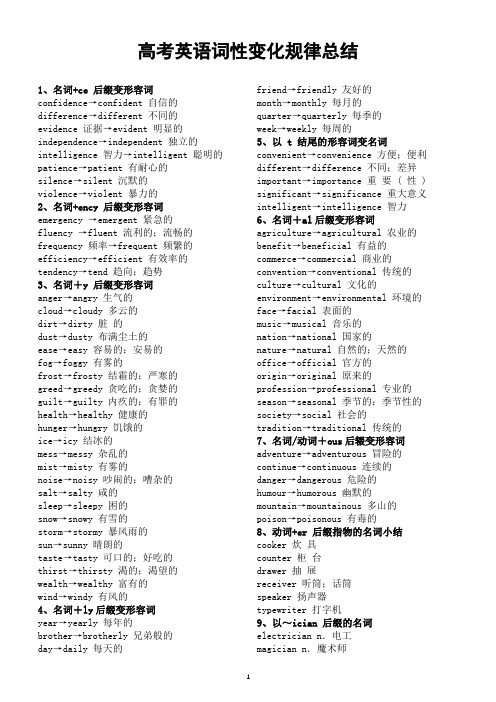
高考英语词性变化规律总结1、名词+ce 后缀变形容词confidence→confident 自信的difference→different 不同的evidence 证据→evident 明显的independence→independent 独立的intelligence 智力→intelligent 聪明的patience→patient 有耐心的silence→silent 沉默的violence→violent 暴力的2、名词+ency 后缀变形容词emergency →emergent 紧急的fluency →fluent 流利的;流畅的frequency 频率→frequent 频繁的efficiency→efficient 有效率的tendency→tend 趋向;趋势3、名词+y 后缀变形容词anger→angry 生气的cloud→cloudy 多云的dirt→dirty 脏的dust→dusty 布满尘土的ease→easy 容易的;安易的fog→foggy 有雾的frost→frosty 结霜的;严寒的greed→greedy 贪吃的;贪婪的guilt→guilty 内疚的;有罪的health→healthy 健康的hunger→hungry 饥饿的ice→icy 结冰的mess→messy 杂乱的mist→misty 有雾的noise→noisy 吵闹的;嘈杂的salt→salty 咸的sleep→sleepy 困的snow→snowy 有雪的storm→stormy 暴风雨的sun→sunny 晴朗的taste→tasty 可口的;好吃的thirst→thirsty 渴的;渴望的wealth→wealthy 富有的wind→windy 有风的4、名词+ly后缀变形容词year→yearly 每年的brother→brotherly 兄弟般的day→daily 每天的friend→friendly 友好的month→monthly 每月的quarter→quarterly 每季的week→weekly 每周的5、以 t 结尾的形容词变名词convenient→convenience 方便;便利different→difference 不同;差异important→importance 重要 ( 性 ) significant→significance 重大意义intelligent→intelligence 智力6、名词+al后缀变形容词agriculture→agricultural 农业的benefit→beneficial 有益的commerce→commercial 商业的convention→conventional 传统的culture→cultural 文化的environment→environmental 环境的face→facial 表面的music→musical 音乐的nation→national 国家的nature→natural 自然的;天然的office→official 官方的origin→original 原来的profession→professional 专业的season→seasonal 季节的;季节性的society→social 社会的tradition→traditional 传统的7、名词/动词+ous后辍变形容词adventure→adventurous 冒险的continue→continuous 连续的danger→dangerous 危险的humour→humorous 幽默的mountain→mountainous 多山的poison→poisonous 有毒的8、动词+er 后缀指物的名词小结cooker 炊具counter 柜台drawer 抽屉receiver 听筒;话筒speaker 扬声器typewriter 打字机9、以~ician 后缀的名词electrician n.电工magician n.魔术师musician n.音乐家physician n.内科医生politician n.政治家technician n.技术员10、以~ist 为后缀的名词art→artist 艺术家biology→biologist 生物学家journal→journalist 新闻工作者;记者physics→physicist 物理学家piano→pianist 钢琴家psychology→psychologist 心理学家science→scientist 科学家social→socialist 社会主义者special→specialist 专家tour→tourist 游客11、以~ology后缀结尾的名词archaeology 考古学biology 生物学ecology 生态学geology 地质学psychology 心理学sociology 社会学technology 技术;工艺12、名词+~ic后缀形容词drama→dramatic 戏剧(性)的energy→energetic 精力充沛的enthusiasm→enthusiastic 热情的romance→romantic 浪漫的science→scientific 科学的sympathy→sympathetic 同情的13、名词+~hood 后缀变名词adult→adulthood 成年boy→boyhood 少年时代brother→brotherhood 手足之情child→childhood 童年man→manhood 男子气概neighbour→neighbourhood 邻里;街坊14、以~ship 后缀的名词championship 冠头军衔friendship 友谊hardship 困苦;苦难leadership 领导地位;领导才能membership 成员资格relationship 关系scholarship 奖学金15、动词+~y 后缀变名词deliver→delivery 运送discover→discovery 发现recover→recovery 康复;恢复16、动词+~ing 后缀变名词begin→beginning 开始;开端build→building 建筑(物)cross→crossing 十字路口end→ending 结局;结尾engine→engineering 工程feel→feeling 感觉hear→hearing 听力market→marketing 促销meet →meeting 会议paint→painting 绘画;油画spend→spending 花销suffer→suffering 苦难train→training 训练;培养17、动词+~ment 后缀变名词acquire→acquirement n. 取得accomplish→accomplishment 成就achieve→achievement 成就adjust→adjustment 调整;调节amuse→amusement 愉快;快乐;消遣announce→announcement 宣告;述说appoint→appointment 约会;预约;任命argue→argument 争论arrange→arrangement 安排assess→assessment 评估assign→assignment 分配;任务astonish→astonishment 惊讶develop→development 发展disappoint→disappointment 失望embarrass→embarrassment 尴尬employ→employment 雇用enjoy→enjoyment 享受;欢乐entertain→entertainment 款待;娱乐equip→equipment 设备establish→establishment 建立govern→government 统治;政府improve→improvement 提高judge→judgement 判断move→movement 运动;移动punish→punishment 惩罚settle→settlement 定居;解决state→statement 陈述;说明18、以~ive 后缀变形容词act→active 积极的attract→attractive 吸引人的cooperate→cooperative 合作的impress→impressive 给人印象深刻的protect→protective 保护的relate→relative 相关的sense→sensitive 敏感的negative 消极的objective 客观的passive 被动的positive 积极的subjective 主观的19、动词+~able后缀变形容词accept→acceptable 可接受的adjust→adjustable 可调节的admire→admirable 令人钦佩的afford→affordable 负担得起的change→changeable 易变的comfort→comfortable 舒服的consider→considerable 重要的;相当大的desire→desirable 值得做的;可取的enjoy→enjoyable 令人愉快的favour→favourable 赞成的;有利的forget→forgettable 健忘的honour→honourable 可敬的;光荣的reach→reachable 可获得的;可达到的reason→reasonable 合理的rely→reliable 可靠的;可信赖的remark→remarkable 不平凡的suit→suitable 合适的understand→understandable 可理解的value→valuable 宝贵的20、动词+~ed 变形容词absorb→absorbed 专心的;聚精会神的accustom→accustomed 习惯的balance→balanced 平衡的bury→buried 专心的complicate→complicated 复杂的determine→determined 坚定的;有决心的devote→devoted 忠实的experience→experienced 有经验的learn→learned 博学的limit→limited 有限的organize→organized 有组织的suppose→supposed 应该的relate→related 相关的skill→skilled 熟练的unit→united 联合的;统一的21、动词+~ing/ +~ed 变形容词amuse→amusing 好笑的;有趣的→amused 愉快的astonish→astonishing 令人惊讶的→astonished 感到惊讶的bore→bored 厌烦的→boring 令人厌烦的confuse→confusing 令人迷惑的→confused 感到迷惑的convince→convincing 令人信服的→convinced 坚信不移的depress→depressing 令人沮丧的→depressed 沮丧的disappoint→disappointed 失望的→disappointing 令人失望的disturb→disturbing 令人不安的;引起烦恼的→disturbed 扰乱的;精神失常的embarrass→embarrassing 令人尴尬的→embarrassed 尴尬的excite→excited 兴奋的→exciting 令人兴奋的frighten→frightened 害怕的→frightening 令人害怕的relax→relaxing 使人放松的→relaxed 轻松的satisfy→satisfying 令人满意的→satisfied 对……满意的shock→shocked 震惊的→shocking 令人震惊的surprise→surprised 吃惊的→surprising 令人吃惊的tire→tired 疲劳的→tiring 令人疲劳的22、动词+~tion后缀变名词accelerate→acceleration 加速accumulate→accumulation 积累adapt→adaptation 适应;改编addict→addiction 沉溺;嗜好admire→admiration 羡慕advocate→advocation 拥护apply→application 申请appreciate→appreciation 感激;欣赏assume→assumption 假定;设想celebrate→celebration 庆祝classify→classification 分类;归类combine→combination 联合congratulate→congratulation 祝贺construct→construction 建筑物consume→consumption 消费contradict→contradiction 反驳contribute→contribution 贡献cooperate→cooperation 合作correct→correction 改正;纠正create→creation 创造;创建declare→declaration 宣言;公告decorate→decoration 装饰decorate→decoration 装饰determine→determination 决心digest→digestion 消化elect→election 竞选;选举erupt→eruption 火山爆发evaluate→evaluation 评估exhibit→exhibition 展览;展览会expect→expectation 期望;期待fascinate→fascination 魅力;入迷graduate→graduation 毕业hesitate→hesitation 犹豫;踌躇imagine→imagination 想象immigrate→immigration 迁移;移居indicate→indication 指示;暗示infect→infection 传染interrupt→interruption 中断object→objection 反对occupy→occupation 占领;占据organize→organization 组织pollute→pollution 污染predict→prediction 预言prepare→preparation 准备protect→protection 保护recommend→recommendation 推荐;介绍reflect→reflection 思考;反映regulate→regulation 规则;规章reject→rejection 拒绝;抛弃relax→relaxation 放松atisfy→satisfaction 满意;满足starve→starvation 挨饿;饿死substitute→substitution 代替;取代translate→translation 翻译transport→transportation 交通23、动词+~ure后缀变名词press→pressure 压力please→pleasure 乐事;快乐expose→exposure 暴露;揭发fail→failure 失败mix→mixture 混合物24、动词+~sion后缀变名词admit→admission 容许;承认permit→permission 允许impress→impression 印象express→expression 表情;表达revise→revision 复习possess→possession 拥有conclude→conclusion 结论confuse→confusion 困惑;混淆decide→decision 决定25、动词/形容词+~ance后缀变名词guide→guidance 指导tolerate→tolerance 宽容ignore→ignorance 无知;愚昧appear→appearance 出现important→importance 重要(性) elegant→elegance 优雅大方assist→assistance 援助resist→resistance 抵抗guide→guidance 指导annoy→annoyance 恼怒26、形容词+~ity 后缀变名词electric→electricity 电;电流;电学equal→equality 平等major→majority 大多数popular→popularity 受欢迎;流行real→reality 现实secure→security 安全similar→similarity 相似点27、以后缀~ity 结尾的名词cruel—cruelty 残忍diverise—diversity 多样性necessary—necessity 必需品;需要possible—possibility 可能性secure—security 安全similar—similarity 相似(性)28、形容词+~en后缀变动词bright→brighten 使愉快;使明亮broad→broaden 加宽;拓宽dark→darken 使变暗deep→deepen 加深;使变深fright→frighten (使)惊吓hard→harden 使变硬light→lighten 使变轻long→lengthen 加长loose→loosen (使)变松;放松;松开quick→quicken 加快ripe→ripen 变成熟;使成熟sharp→sharpen 磨快;使锋利short→shorten 变短;缩短soft→soften 使变软strong→strengthen 加强weak→weaken 使变弱wide→widen 加宽;拓宽29、形容词+~th变名词deep→depth 深;深处grow→growth 成长long→length 长;长度strong→strength 力量true→truth 真理warm→warmth 温暖wide→width 宽度30、形容词+~ness后缀变名词aware→awareness 意识careless→carelessness 粗心大意conscious→consciousness 知觉dark→darkness 黑暗eager→eagerness 渴望happy→happiness 幸福;高兴kind→kindness 仁慈;好意lonely→loneliness 孤独rude→rudeness 粗鲁sad→sadness 悲哀;悲伤sick→sickness 疾病weak→weakness 弱点;虚弱willing→willingness 愿意31、以~ious 结尾的形容词ambitious 有雄心的;野心勃勃的cautious 小心的;谨慎的conscious 有意识的envious 忌妒的;猜忌的mysterious 神秘的religious 宗教上的;信奉宗教的;虔诚的32、以~ical 结尾的形容词economical 经济的;节约的electrical 与电有关的historical 与历史有关的logical 逻辑的magical 神奇的;像变魔术似的musical 音乐的;悦耳的political 政治的33、形容词+~ly 后缀变副词fluent→fluently 流利地frequent→frequently 频繁地;经常地actual→actually 实际上entire→entirely 完全;全部地gradual→gradually 逐渐地fortunate→fortunately 幸运地final→finally 最后extreme→extremely 极其34、动词+前缀dis变否定词agree→disagree 不同意appear→disappear 消失appoint→disappoint 使失望approve→disapprove 反对;不赞成comfort→discomfort 使不舒适cover→discover 发现like→dislike 不喜欢35、形容词+in 前缀变否定词accurate→inaccurate 不精确的adequate→inadequate 不充分的appropriate→inappropriate 不合适的expensive→inexpensive 不贵的;便宜的experienced→inexperienced 经验不足的36、形容词+im前缀变否定词patient→impatient 不耐心的polite→impolite 没礼貌的possible→impossible 不可能的practical→impractical 不实用的proper→improper 不合适的37、形容词+un前缀变否定词able→unable 不能的aware→unaware 不知道的believable→unbelievable 不可相信的certain→uncertain 不确定的clear→unclear 不清楚的comfortable→uncomfortable 不舒服的common→uncommon 不常有的conscious→unconscious 失去知觉的fair→unfair 不公平的forgettable→unforgettable 难忘的fortunate→unfortunate 不幸的fit→unfit 不合适的friendly→unfriendly 不友好的happy→unhappy 不高兴的;不幸福的known→unknown 无名的likely→unlikely 不可能的lucky→unlucky 不幸的necessary→unnecessary 不必要的pleasant→unpleasant 不愉快的unfortunate 不幸的unimportant 不重要的usual→unusual 不寻常的willing→unwilling 不情愿的38、后缀~less构成的形容词aim→aimless 无目的的care→careless 粗心大意的count→countless 无数的doubt→doubtless 无疑的end→endless 无尽的harm→harmless 无害的help→helpless 无助的home→homeless 无家可归的hope→hopeless 无希望的job→jobless 失业的limit→limitless 无限的rest→restless 不安的use→useless 无用的39、含 mis前缀的动词mistake 误会misunderstand 误解misuse 误用;滥用mislead 误导mistrust 不信任40、使动用法“前缀 en+形容词/名词”变动词rich→enrich 使充实able→enable 使能够large→enlarge 使扩大sure→ensure 确保;担保danger→endanger 使……遭遇危险title→entitle 给……起题目/命名courage→encourage 鼓励41、含 fore前缀的单词forecast vt. 预报;预测foresee vt. 预见;预料;预知foreword n. 前言forehead n. 额头forearm n. 前臂forehead n. 额头forearm n. 前臂forecast vt. 预报foresee vt. 预见;预知foreword n. 前言foretell v. 预言;预示42、~ward 后缀方位词southward 向南northward 向北eastward 向东westward 向西upward 向上backward 向后43、以后缀~ify结尾的动词simple→simplify 简化beauty→beautify 美化pure→purify 净化identity→identify 鉴定;识别出class→classify 分类44、动词+re前缀变动词cycle→recycle 再利用;回收利用use→reuse 重新使用build→rebuild 重建write→rewrite 重写tell→retell 复述45、注意男女不同steward 乘务员;服务员stewardess 女乘务员waiter 男服务员waitress 女服务员actor 男演员actress 女演员host 男主人hostess 女主人46、现在分词/过去分词用作介词或连词小结assume→assuming 假设;假定include→including 包含;包括suppose→supposing 假设;假如provide→provided/providing 假设;如果consider→considering 鉴于;考虑到concern→concerning 关于give→given 鉴于;考虑到。
动词加ing形式英语语法知识点小结
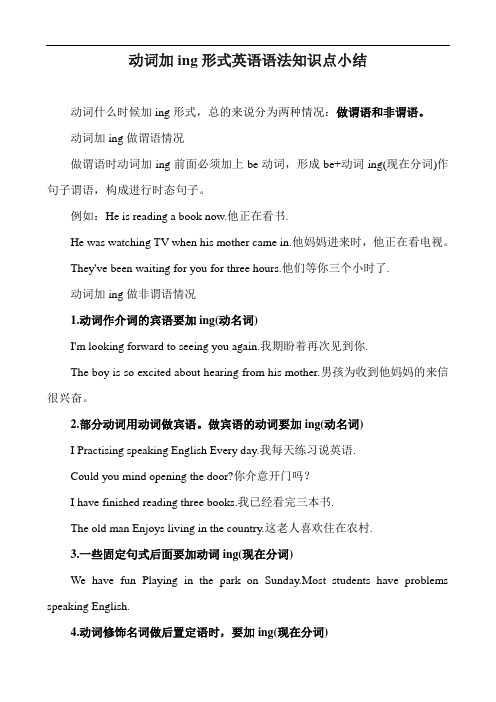
动词加ing形式英语语法知识点小结动词什么时候加ing形式,总的来说分为两种情况:做谓语和非谓语。
动词加ing做谓语情况做谓语时动词加ing前面必须加上be动词,形成be+动词ing(现在分词)作句子谓语,构成进行时态句子。
例如:He is reading a book now.他正在看书.He was watching TV when his mother came in.他妈妈进来时,他正在看电视。
They've been waiting for you for three hours.他们等你三个小时了.动词加ing做非谓语情况1.动词作介词的宾语要加ing(动名词)I'm looking forward to seeing you again.我期盼着再次见到你.The boy is so excited about hearing from his mother.男孩为收到他妈妈的来信很兴奋。
2.部分动词用动词做宾语。
做宾语的动词要加ing(动名词)I Practising speaking English Every day.我每天练习说英语.Could you mind opening the door?你介意开门吗?I have finished reading three books.我已经看完三本书.The old man Enjoys living in the country.这老人喜欢住在农村.3.一些固定句式后面要加动词ing(现在分词)We have fun Playing in the park on Sunday.Most students have problems speaking English.4.动词修饰名词做后置定语时,要加ing(现在分词)There is a boy Crying over there.I felt something moving in the house.I heard someone singing in the next room.5.动词做主语和表语时,动词要加ing(动名词)Swimming is very popular in summer.His job is teaching English.综上所述,动词在以上六种情况需要加ing!增强背诵记忆的方法• 勤动手指锻炼手指功能可健脑益智,促进思维。
动词用法小结(五篇范文)

动词用法小结(五篇范文)第一篇:动词用法小结动词用法小结一、如何变一般疑问句: 1. 有be动词(am,is,are),情态动词can, may, would的,直接将这些词提前,句尾加?。
2. 实意动词作谓语的,在句首加Do或Does,谓语动词用原形。
3. 在一般疑问句中,some变any(委婉请求的句子不变),and可变为or。
4. 一般疑问句用Yes或No回答。
二、如何变否定句:1. 有be动词(am,is,are),情态动词can, may, would 的,直接在这些词提后加not,可缩写。
2. 实意动词作谓语的,在谓语动词前加don’t或doesn’t,谓语动词用原形。
3. 在否定句中,some变any,and变为or。
三、固定搭配1. 使用动词原形(do)的几种情况:① 助动词(do,does)及情态动词(can,may,would)后跟动词原形;② 祈使句的句首用动词原形;③ help sb. do sth.(帮助某人做某事)let sb. do sth. (让我们做某事)。
2. 使用动词不定式(to do)的几种情况:① to do作目的状语,如:Come to visit② to do作定语,如:a funny time to eat breakfast; a good place to visit, sth. to eat/drink;③ want to do =would like to do(想做某事);want sb to do =would like sb to do(想让某人做某事);hope to do=wish to do(希望做某事);help sb. to do sth.(帮助某人做某事)like/love to do(喜欢做某事;某次具体的);ask/tell sb (not) to do(要求/告诉某人(不)做某事);learn to do (学习做某事);need to do(需要做某事);teach sb to do (教给某人做某事)2. 使用动词ing(doing)的几种情况:①介词后,如:with,at,in, on, about, for …② like/love doing(喜欢做某事;习惯性的);enjoy doing (喜欢做某事); have fun doing(做某事开心),be busy doing (忙于做某事);考试注意事项:1. 考前听十分钟听力,背Unit1-10所有黑体词,背Units6-10的grammar focus和3a。
俄语中某些名词和动词的特殊变化规律小结
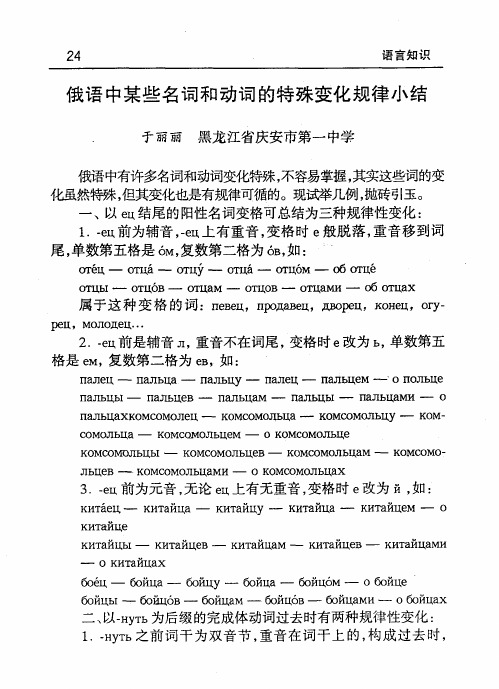
o r J I l f H y J mc b
三、 以. H  ̄ I T B为后缀 的完成体动词 变位 , 分为下列 三种 : 1 . 一 H H T b 之前为辅 音 , 一般 去掉. H  ̄ I T B , 变位是 :
C H H T B‘ 。 — C H H My ‘ 。 — —C H I 4 Me NB。 ’ — —C HH Me T 。 — —C HH Me T e‘ ‘ — —C H HMe M
3 . . e l l 前 为元 音 , 无论 e u上有无重音 , 变格 时 e 改为 酋, 如:
K H T  ̄ t e I % ・ — — —K H T a i f  ̄ a- - — —K H T a i f  ̄ y・ - — —K H T a  ̄ a・ - — —K H T a i f  ̄ e M。 - — —O
n p mr H y T I , 一 np mr u y n, n p s n ' H y n a,n p mr H y no,Ⅱ p b I r H y J I H
B e p  ̄ 5 r T t  ̄ 5 t — —B e p H y n c a・ 。 。 — —  ̄ e p H y n a c s・ - - — —B e p H y a o c s— —B e p H y - ・
一
、
c r r 姐 一 嘶
一 0 T u 一 嘶
一 O T  ̄ 6 M一 0 6 c r r
O T n , b I— —O T n , 6 B— —O T Ra M — —O T  ̄ O B— —o T Ⅱ a MH — —o 6 O T  ̄ a X
属于这 种 变 格 的词 :Ⅱ e B e Ⅱ ,n p o ,  ̄e R , ̄ 3 3 o p e u ,K o H e R ,o r y —
动词ing小结

动词-ing形式小结动词-ing形式概述v.-ing 形式包括传统语法的现在分词和动名词两部分,像动词不定式一样,它既具有动词时态和语态的特征,又具有名词、形容词和副词的特征,它可以在句中作主语、表语、定语、宾语、状语、宾语补足语、主语补足语等。
形式的时态、语态V.-ing形式的一般式的构成,表示动作发生在谓语动词动作的同时、之前或之后。
用来泛指动作,没有时间的区分。
Seeking after knowledge is human nature.求知是人的本性。
Travelling abroad can widen one’s outlook.出国旅游会扩大人们的视野。
Eating too much chocolate is bad for your teeth.吃太多的巧克力对你的牙齿有害。
My favourite sport is playing table tennis.我最喜欢的运动是打乒乓球。
行为与主要动作同时发生,表示伴随。
The students came into the classroom laughing and talking.学生们又说又笑地走进了教室。
As she saw me,she came over smiling.她看到我时,笑容可掬地走过来。
Doing the washing up,Connie was planning her holiday.康妮在洗碗的时刻盘算着怎样度假。
行为在主要动作之前或之后。
Antonio remembered sending his mother an email three times last month.安东尼记得上个月给他母亲发了三次电子邮件.(在前)Mr. Lee went out shutting the door behind him.李先生出去后将门随手关上。
(在后)v.-ing形式的完成式v.-ing形式的完成式由“having + v.-ed 形式”构成,表示动作发生在谓语动词表示的动作之前。
高考英语_衡水中学考纲重点词汇词性转化规律总结

physician n.内科医生 politician n.政治家 technician n.技术员 以-ist 为后缀的高频名词全接触 art→artist 艺术家 biology→biologist 生物学家 journal→journalist 新闻工作者;记者 physics→physicist 物理学家 piano→pianist 钢琴家 psychology→psychologist 心理学家 science→scientist 科学家 social→socialist 社会主义者 special→specialist 专家 tour→tourist 游客 后缀“-ology”高频名词一览 archaeology 考古学 biology 生物学 ecology 生态学 geology 地质学 psychology 心理学 sociology 社会学 technology 技术;工艺 名词+--ic 后缀形容词 drama→dramatic 戏剧(性)的 energy→energetic 精力充沛的 enthusiasm→enthusiastic 热情的 romance→romantic 浪漫的 science→scientific 科学的 sympathy→sympathetic 同情的 名词+-hood 后缀变名词 adult→adulthood 成年
高考英语 考纲词性变化规律总结
名词 名词+ce 后缀变形容词
confidence→confident 自信的 difference→different 不同的 evidence 证据→evident 明显的 independence→independent 独立的 intelligence 智力→intelligent 聪明的 patience→patient 有耐心的 silence→silent 沉默的 violence→violent 暴力的 名词+-ency 后缀变形容词 emergency →emergent 紧急的 fluency →fluent 流利的;流畅的 frequency 频率→frequent 频繁的 efficiency→efficient 有效率的 tendency→tend 趋向;趋势 名词+-y 后缀变形容词 anger→angry 生气的 cloud→cloudy 多云的 dirt→dirty 脏的 dust→dusty 布满尘土的 ease→easy 容易的;安易的 fog→foggy 有雾的 frost→frosty 结霜的;严寒的 greed→greedy 贪吃的;贪婪的 guilt→guilty 内疚的;有罪的 health→healthy 健康的 hunger→hungry 饥饿的 ice→icy 结冰的 mess→messy 杂乱的
英语形容词,名词,动词,副词 互变方法规律

英语形容词,名词,动词,副词互变方法规律一.名词变形容词:1.名词后加-y, 如:luck→lucky, cloud→cloudy; wind→windy; rain→rainy; sun→sunny, snow→snowy noise-noisy health→healthy2.在名词后加-ly, 如:friend→friendly love→lovely day→daily3.方位名词加-ern,如:east→eastern west→westernsouth→southern north→northern二.动词变形容词1.词尾加ful:use - useful, care - careful, help - helpful,thank - thankful peace - peaceful,forget - forgetful, play - playful,succeed - successful, wonder - wonderful2.词尾加d或ed:please - pleased, unite - united, excite - excited, surprise - surprised, organize - organized, close - closed, wound - wounded, relax - relaxed,develop - developed, appreciate - appreciated,frustrate - frustrated, interest - interested, annoy - annoyed, use - used, frighten - frightened, crowd - crowded, thrill - thrilled, pollute - polluted3.词尾加ing:interest - interesting,surprise - surprising,excite - excitingdevelop - developing,frighten - frightening,thrill - thyrillingfrustrate - frustrating,relax _ relaxing,live - livingrock - rocking,sleep - sleeping4.词尾变y为i,加ed:worry - worried, marry - married,fry - fried, terrify - terrified satisfy - satisfied5.词尾加able:know - knowledgeable, enjoy - enjoyabe,suit - suitable,adjust - adjustable, comfort - comfortable6.其它:lose - lost, fool - foolish, live - livelysleep - sleepy / sleeping / asleep,wake - awake, taste - tastyspeak - spoken, break - broken, die - dead, educate - aducational,world - worldwide三.形容词变副词规律小结例词1.大部分形容词加lycareless----carelesslyquiet----quietlydifferent----differently2.以le结尾的形容词变le为lypossible----possiblyterrible----terriblycomfortable----comfortablygentle----gently3.以y结尾的形容词变y为ilyeasy----easilyangry----angrilynoisy----noisilyhappy----happilyheavy----heavilyhealthy----healthily不规则变化本身既是形容词也是副词,无需改变fast----fastearly----earlyhigh----highhard----hardlate----latefar----farwide----widealone----alone形容词和副词为完全不同的单词good----well需要去掉字母e的单词true----trulygentle----gently虽然以ly结尾,但却是形容词,不能直接用来修饰动词friendlylivelylovelylonelyLikely有些形容词本身即为副词,同时也有加ly的副词形式。
V-ing形式用法小结
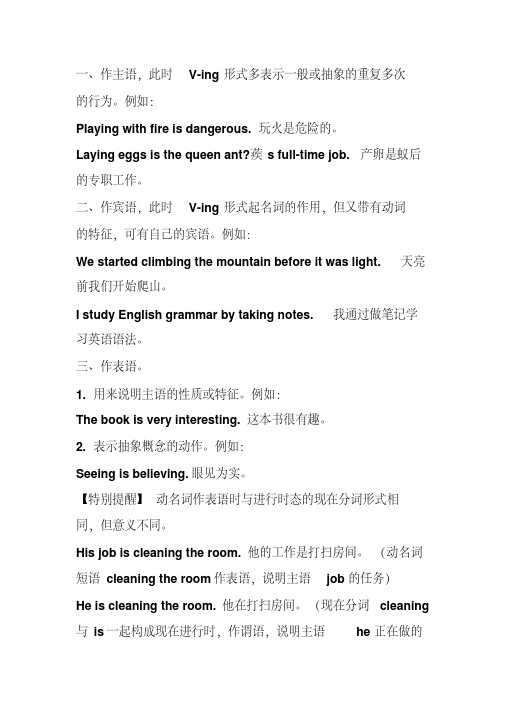
一、作主语,此时V-ing形式多表示一般或抽象的重复多次的行为。
例如:Playing with fire is dangerous. 玩火是危险的。
Laying eggs is the queen ant?蒺s full-time job. 产卵是蚁后的专职工作。
二、作宾语,此时V-ing形式起名词的作用,但又带有动词的特征,可有自己的宾语。
例如:We started climbing the mountain before it was light. 天亮前我们开始爬山。
I study English grammar by taking notes. 我通过做笔记学习英语语法。
三、作表语。
1. 用来说明主语的性质或特征。
例如:The book is very interesting. 这本书很有趣。
2. 表示抽象概念的动作。
例如:Seeing is believing. 眼见为实。
【特别提醒】动名词作表语时与进行时态的现在分词形式相同,但意义不同。
His job is cleaning the room. 他的工作是打扫房间。
(动名词短语cleaning the room作表语,说明主语job的任务)He is cleaning the room. 他在打扫房间。
(现在分词cleaning 与is一起构成现在进行时,作谓语,说明主语he正在做的动作。
)四、作定语。
1. 作前置定语,用来说明被修饰词的用途和性质,即“……的”。
例如:The reading room is bright and large. 阅览室明亮而宽敞。
I found a sleeping baby on the bed. 我发现在床上有个熟睡的孩子。
2. 作后置定语,往往表示正在发生或与谓语动词同时发生的动作,其作用相当于一个定语从句。
例如:The man standing by the window (= who is standing by the window) is our teacher. 那个站在窗户旁边的人是我们的老师。
英语词汇语法用法小结
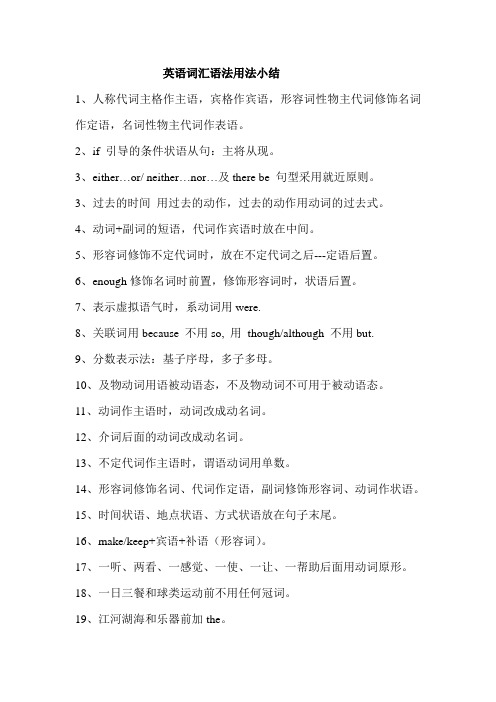
英语词汇语法用法小结1、人称代词主格作主语,宾格作宾语,形容词性物主代词修饰名词作定语,名词性物主代词作表语。
2、if 引导的条件状语从句:主将从现。
3、either…or/ neither…nor…及there be 句型采用就近原则。
3、过去的时间用过去的动作,过去的动作用动词的过去式。
4、动词+副词的短语,代词作宾语时放在中间。
5、形容词修饰不定代词时,放在不定代词之后---定语后置。
6、enough修饰名词时前置,修饰形容词时,状语后置。
7、表示虚拟语气时,系动词用were.8、关联词用because 不用so, 用though/although 不用but.9、分数表示法:基子序母,多子多母。
10、及物动词用语被动语态,不及物动词不可用于被动语态。
11、动词作主语时,动词改成动名词。
12、介词后面的动词改成动名词。
13、不定代词作主语时,谓语动词用单数。
14、形容词修饰名词、代词作定语,副词修饰形容词、动词作状语。
15、时间状语、地点状语、方式状语放在句子末尾。
16、make/keep+宾语+补语(形容词)。
17、一听、两看、一感觉、一使、一让、一帮助后面用动词原形。
18、一日三餐和球类运动前不用任何冠词。
19、江河湖海和乐器前加the。
20、表示一天的某时用in,表示某天的某时用on,表示几点几分用at,表示月、季、年用in。
21、a little, much, even, far, still 可修饰比较级。
22、one of + 最高级+ 名词复数。
23、两者比较用比较级,三者或三者以上比较用最高级。
24、单音节词的比较级加er,最高级加est,部分双音节词和多音节的比较级前加more, 最高级前加most。
25、两者比较强调一者时,比较级前也加the。
26、附加疑问句:前肯后否,前否后肯。
27、表示客观存在、客观真理、自然现象时,用一般现在时。
28、感叹句中How修饰形容词、副词,What 修饰名词。
